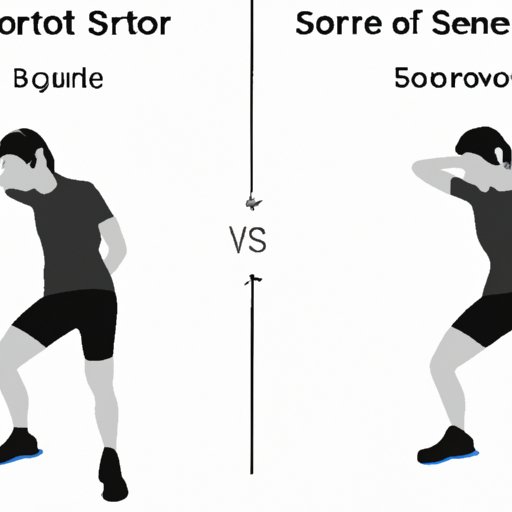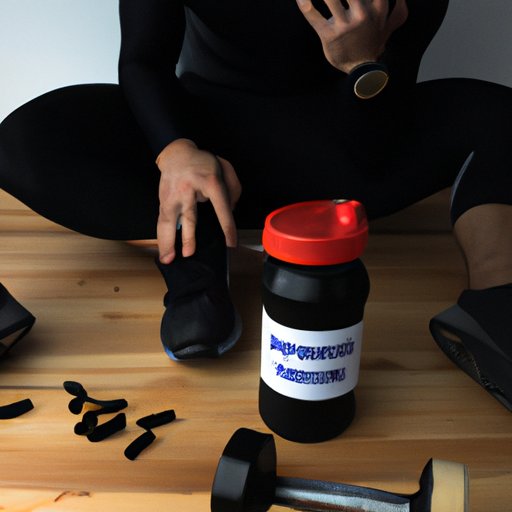Introduction
Have you ever finished a workout feeling aches and pains in your muscles? If so, you’re not alone — post-workout soreness is a common experience among people who exercise regularly. But what exactly is causing your soreness, and how long can you expect to feel it? In this article, we’ll explore the causes of post-workout soreness, the duration of soreness, and strategies for reducing it. Read on to learn more.
Identifying the Causes of Post-Workout Soreness
Post-workout soreness is caused by a phenomenon known as delayed onset muscle soreness (DOMS). DOMS occurs when your muscles are subjected to physical stress from exercise. The physical stress causes microscopic damage to the muscle fibers, resulting in an inflammatory response that leads to pain and stiffness. DOMS typically appears 12-24 hours after exercise and peaks at 24-72 hours. It can last anywhere from three to seven days.
Many factors can cause post-workout soreness, such as type of exercise, intensity of exercise, hydration, and nutrition. Let’s take a closer look at each of these factors.
Exploring How Long You Can Expect to Feel Sore After Working Out
The duration of post-workout soreness depends on many factors, including the type and intensity of exercise. Generally speaking, the more intense the exercise, the longer the soreness will last. For example, if you do a strenuous HIIT (high-intensity interval training) workout, you can expect to be sore for several days afterwards. On the other hand, if you do a moderate-intensity workout, such as a brisk walk, you may only be sore for a day or two.
It’s also important to note that different types of exercise can lead to different levels and durations of soreness. For example, strength training tends to cause more soreness than cardio, and the soreness tends to last longer. This is because strength training creates small tears in the muscle fibers, which requires more time for the body to repair. Cardio, on the other hand, does not create as much damage to the muscle fibers and therefore does not cause as much soreness.

Examining the Benefits of Feeling Sore After Exercise
Although post-workout soreness can be uncomfortable, there are some benefits to feeling sore after exercising. One benefit is that it serves as a reminder that you worked hard and pushed your body beyond its comfort zone. It also indicates that your muscles have gone through a growth process, which can help you achieve your fitness goals. Finally, it can motivate you to keep up with your exercise routine.

Understanding How Different Types of Exercise Affect Duration of Soreness
As mentioned above, different types of exercise can lead to different levels and durations of soreness. Here are some factors that can affect the duration of your post-workout soreness:
- Intensity: High-intensity exercises tend to cause more soreness than lower-intensity exercises.
- Frequency: Doing the same type of exercise too often can cause your muscles to become accustomed to the stress and lead to less soreness.
- Type of exercise: Strength training tends to cause more soreness than cardio.
Uncovering What Factors Influence Post-Exercise Soreness
In addition to type and intensity of exercise, other factors can also influence post-exercise soreness. Here are some of the most important ones:
- Hydration: Staying hydrated before, during, and after exercise can help reduce the severity of soreness.
- Nutrition: Eating a balanced diet before and after exercise can help reduce the severity of soreness.
Investigating Strategies to Reduce Post-Workout Soreness
Although post-workout soreness is a normal part of exercising, there are some strategies you can use to reduce it. Here are some tips to minimize post-workout soreness:
- Warm up and cool down: A proper warm-up and cool-down can help reduce the severity of soreness.
- Stay hydrated: Drink plenty of water before, during, and after exercise.
- Eat a balanced diet: Eating a balanced diet before and after exercise can help reduce the severity of soreness.
- Take breaks: Take regular breaks throughout your workout to give your muscles time to recover.
- Get enough rest: Make sure you get enough sleep and rest between workouts.
In addition to the tips above, there are also some natural remedies you can try to reduce post-workout soreness. These include taking Epsom salt baths, using essential oils, and stretching. However, it’s important to speak to your doctor before trying any natural remedies.
Conclusion
Post-workout soreness is a common experience among people who exercise regularly. It’s caused by a phenomenon known as delayed onset muscle soreness (DOMS), which is the result of physical stress from exercise. The duration of soreness depends on the type and intensity of exercise, as well as other factors such as hydration and nutrition. Although post-workout soreness can be uncomfortable, there are some benefits to feeling sore after exercising. There are also some strategies you can use to reduce the severity of soreness, such as staying hydrated, eating a balanced diet, and taking breaks. Finally, there are some natural remedies you can try to reduce post-workout soreness, although it’s important to speak to your doctor before trying any of them.
Post-workout soreness is a normal part of exercising, and understanding the causes, duration, and strategies for relief can help you make the most of your workouts and reach your fitness goals.
(Note: Is this article not meeting your expectations? Do you have knowledge or insights to share? Unlock new opportunities and expand your reach by joining our authors team. Click Registration to join us and share your expertise with our readers.)
